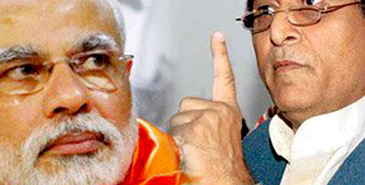Gorakhpur, Nov 13: Hitting out at Prime Minister Narendra Modi for saying there was no intolerance in the land of Mahatma Gandhi, Uttar Pradesh Minority Welfare Minister Azam Khan questioned the statement saying how could he have used the names of the national leader after he was murdered for preaching tolerance.

Addressing the issue of 'intolerance' in India in his joint statement in UK, Prime Minister Modi had said that India was the land of Gandhi and Buddha, and intolerance would not be tolerated at any cost.
"Any event in any corner of India - it doesn't matter if there are even one or two incidents - we will not tolerate it and the law will deal with it strictly. It does not matter whether such an incident is significant for a country of 125 crore people. For us, every incident is serious. We will not accept anything that goes against our social values," Prime Minister Modi had said in his statement.
Prime Minister Modi arrived in the United Kingdom yesterday for a three day visit and was welcomed with a Guard of Honour by his British counterpart David Cameron at the Treasury Quadrangle after which they proceeded to the latter's official residence, 10 Downing Street, for bilateral talks.





Comments
Add new comment